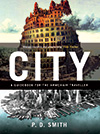The Trouble with City Planning
12 November 2011 | cities, Reviewing, urban planning | One comment
Kristina Ford was director of city planning in New Orleans for eight years before Hurricane Katrina swept across the Big Easy in 2005, bringing floods and devastation on a scale unparalleled in an American city in modern times. According to Ford, the hurricane was an opportunity for city planners to do the job they were trained for: “to devise how to use the city’s lands more to the city’s betterment.” But this didn’t happen.
Ford's The Trouble with City Planning: What New Orleans Can Teach Us (Yale, £18.00) is a detailed and insightful analysis of what went wrong and a blueprint for how city planning can be improved in all cities. Cities are constantly changing and the way land is used impacts the lives of every city dweller. In post-Katrina New Orleans there was a “blizzard of planning”. There were at least five different plans in all, but the process was chaotic and the results largely ignored by the city’s elected leaders. They also failed to address the thorny historical issue of why people (largely poor African Americans) were living in areas – such as the Lower Ninth Ward – which were vulnerable to flooding. As Ford says, “any street that appeared on a map of New Orleans drawn in the nineteenth century…probably did not flood”. Planning decisions made in the early twentieth century placed too much faith in the power of technology to protect new residential areas. And importantly no attempt was made in the post-Katrina pans to explore, let alone explain, these decisions.
According to Ford, even today “a plan for rebuilding New Orleans still remains a most elusive goal”. But the experiences of the residents of New Orleans cast light on the trouble with contemporary urban planning throughout America. Ford wants to put city dwellers back at the heart of urban planning: good plans “are made with citizens and are meant to be used by them”. For a start she wants plans to be written in plain English rather than jargon and to incorporate not just facts but people’s experiences of how they use the city, what they love and hate about the city, what problems need to be solved and what kind of city they want in the future. Planners need to listen more to the people who live and work in the city. When she was a New Orleans city planner residents of New Orleans told Ford that their priorities were easy access to the amenities of the city, neighbourhoods with a strong sense of community, streetcars and cycle lanes. These are the kinds of views that should be at the centre of a city’s plan, argues Ford. A good plan should be “an expression of how the citizenry, working with city planners, believes a city could be made better”. At the heart of her argument is an important point that is often overlooked: cities are first and foremost human environments, not display cases for architecture.
Ford argues passionately that plans need to be “robust and supple documents”, which include the voices of city dwellers, and are “rooted in history”. She acknowledges that the planning process is as much an art as it is a science. There is even room for serendipity: “A Good City Plan acknowledges that what enlivens any city is frequently the product of the unexpected.” But as well as listening to the voices of residents, she is also reasserting the vital role planners must play in creating tomorrow’s cities: “what city planners know is essential to great cities”. By reforming the way city plans are created, Ford believes “the trouble with city planning” can be overcome. As a result mayors will be obliged to use city plans rather than political expediency as the basis for planning decisions. Ford’s idealism is certainly inspiring but this is an idealism grounded in a practical understanding of the challenges of city planning. And in the end, it is this that makes her book so valuable for cities and citizens everywhere.
[NB. This is a longer version of my review published in the Guardian on 12 November 2011.]



Darren Braun | 20 November 2011
This book is now on my Christmas wish list, looks like it'll be a great and informative must read for all current city planners, as well as interested residents and the general public. @urbanabbotsford